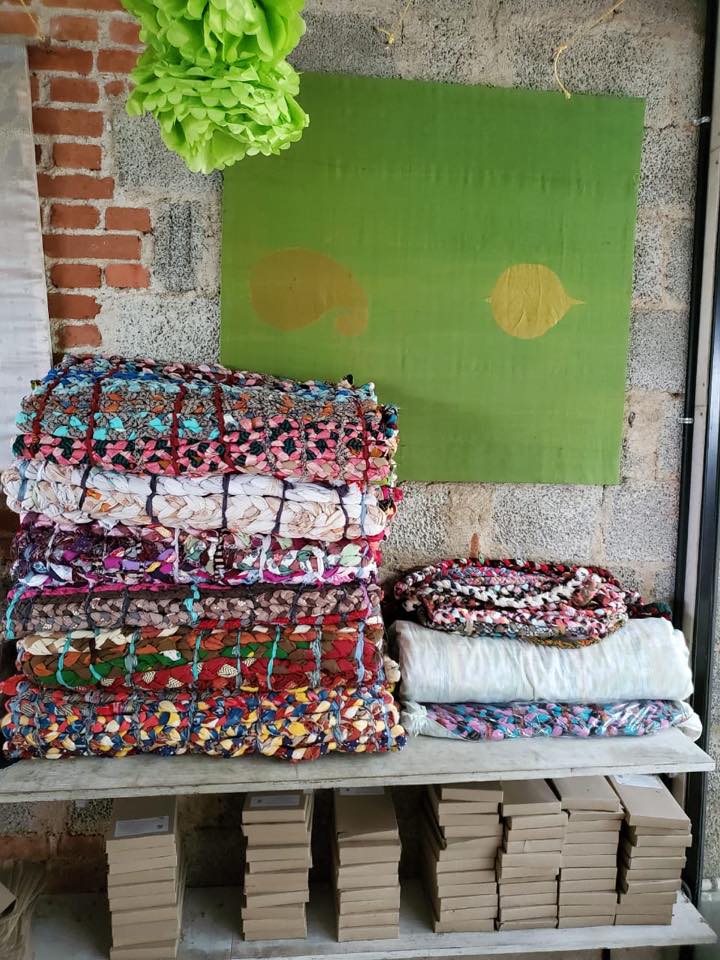 734
734  4 mins
4 mins Lakshmi Menon is upcycling PPE to equip Covid centres in India with much-needed bedding. This is the story of how she got there.
The sight of a houseless family on the road to Bangalore broke Lakshmi Menon’s heart. Their naked baby was sleeping in the street with nothing to lie on.
Lakshmi is a creative designer. She is particularly sensitive to the environmental footprint of products as well as social welfare issues.
She immediately decided to look for a way to provide decent bedding for the houseless.
The result?
She designed a bedroll that is ingeniously simple and inexpensive to make. It requires no machinery or stitching, is easily cleaned and is made from upcycled material. Her design uses “offcut” textiles to make the bedroll.
Upcycling offcut textile scraps gives new life to material that is otherwise destined to become landfill or incinerated.
Lakshmi named her bedroll “Shayya”. The word means “mattress” in Sanskrit.
Any type of scrap textile can be used to weave a Shayya – discarded sarees, dhotis, sheets or curtains.
Textile producers were happy to provide her with the raw materials.
Most importantly the Shayya is very easy to make. The only skill required is knowing how to braid hair.
PURE Living- sustainable ideas with social impact
Lakshmi Menon works relentlessly for and with underprivileged people.
In 2012 she founded the social enterprise PURE Living (Products Upcycled, Recycled and Economised) in Kochi . PURE Living’s mission is to develop sustainable ideas with social impact.
Using her own funds, Lakshmi began producing Shayya bedrolls for her community.
She has donated thousands of Shayyas locally to shelters for houseless people living in the state of Kerala.
And then Covid-19 came to India.
Manufacturing orders decreased dramatically and textile production began grinding to a halt. The production sites where PURE Living had been collecting the clothing scraps switched from manufacturing textiles to producing PPE.
Scrap textile for making Shayyas became increasingly scarce.
The experiment – upcycling PPE
In order to keep producing the Shayyas, Lakshmi decided to try something different. She began using repurposed scraps of PPE to replace the textile scraps.
The solution worked.
As a result, by upcycling PPE PURE Living was actually able to increase production of the Shayya.
After that, Lakshmi Menon began to employ over 20 women who had lost their jobs due to the pandemic. She paid the women out of her own pocket to weave the scraps of PPE into long braids. The women braid roughly 25 metres of fabric and then bind them into bedrolls.

Image: Shayya – Facebook
The sanitary crisis hits
Meanwhile, new sanitary measures were introduced as Covid-19 spread and the situation worsened.
The districts throughout Kerala began to require that all Covid Front Line Treatment Centers (FLTC’s) maintain a minimum of 50 beds to care for people with Covid.
This put an extra burden on the treatment centres. The mattresses used by these centres were expensive and came with a cost of between 500 – 700 rupees per mattress.
And every mattress had to be incinerated after each patient was discharged.
An already urgent situation was becoming more complicated.
Then came another discovery.
It turns out that PPE scraps are an ideal material for making the mattresses needed by the FLTC’s.
Because PPE is partly plastic, the mattresses are washable and reusable which increases the lifespan of the beds.
And as India is the world’s 2nd producer of PPE, PURE Living had again found a reliable source of material for the production of Shayyas.
PURE Living began producing Shayyas for the treatment centres. By upcycling PPE scraps, they were able to donate more than 1,000 Shayyas to FLTC’s in Menon’s hometown and the villages surrounding them.
Requests for Shayyas began pouring in from around Kerala. PURE Living began charging 300 rupees per bedroll. This was the breakeven amount needed to cover the cost of the labour of the women weavers.
The increased demand also gave the women an unexpected, reliable source of income with a job that required practically no training.
Lakhmi Menon explains that “Not only is this waste management, it also creates an essential material at minimum cost.”
Her regenerative design idea stands squarely at the intersection of health, ecology, employment, economics, energy efficiency and access equity.
View this post on Instagram
U.N. recognition for upcycling PPE
The break-even pricing approach taken by PURE Living allows FLTC’s to purchase Shayyas at less than half the cost of what they were previously paying for single-use mattresses.
PURE Living has also produced “How-to” videos that explain the easy-to-learn technique of making a Shayya.
In keeping with their philosophy, these videos are shared freely on PURE Living’s website for anyone to copy, allowing the bedrolls to be made for anyone in need.
Lakshmi actively encourages entrepreneurs from other regions to create their own Shayya production.
The UN has recognised Lakshmi Menon’s Shayya as an “easily replicable Covid innovative idea”.
Lakshmi Menon’s impact is multifaceted.
She has gifted the world with a neat design that solves the problem of access to proper bedding. In doing so, she has also developed a design that provides a sanitary response to the pandemic while helping to support local economies with a locally sourced product that creates replacement job opportunities.
For more information: www.Shaya.in Shayya on Facebook and @PureLivingIn on Instagram
Feature image credit: Marta Ortigosa/Unsplash
For other design stories, also read “Meet the refugee fashion designer tickling people’s humanity“


 https://bowseat.org/gallery/beauty-and-the-deep/
https://bowseat.org/gallery/beauty-and-the-deep/ Teem Khan by Ana Brooks
Teem Khan by Ana Brooks